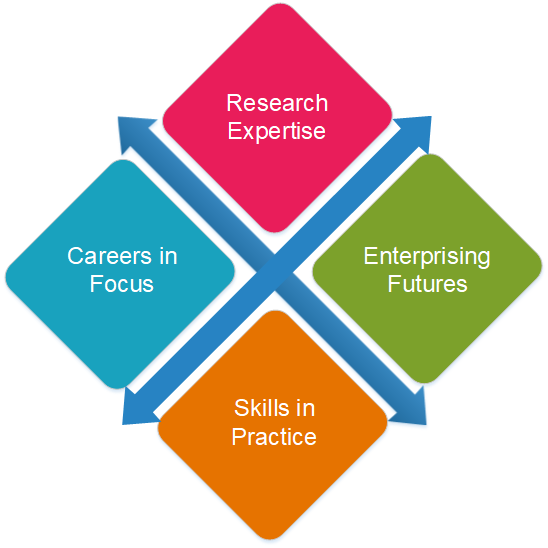UniSA EDGE Capability Framework
The EDGE Capability Framework is UniSA’s way of organising the skills, knowledge and experience that support successful HDR completion and enable your research and career aspirations. It can be useful in:
- Identifying your strengths and areas for improvement
- Planning your development throughout candidature
- Progress review discussions with your supervisory team
- Describing your skills, knowledge and experiences for a wide range of potential employers or grant applications
The Framework is structured into 4 domains. There are 21 capabilities within the domains of the EDGE Framework, arranged across three stages of candidature: commencing, continuing and completing. This structure should help you focus on developing the skills you need at the time you need them during the PhD, and to support your future.

|
DOMAINS
|
COMMENCING
|
CONTINUING
|
COMPLETING
|
|
RESEARCH EXPERTISE: research and contextual capabilities
|
- Candidates orientate themselves as researchers and take responsibility for their research.
- Candidates become familiar with how to conduct research and cultivate disciplinary knowledge.
- Candidates become familiar with and start to apply relevant research methods and techniques.
- Candidates become familiar with and start to apply communication and engagement skills.
|
- Candidates deepen their disciplinary knowledge.
- Candidates apply and refine relevant research methods.
- Candidates use advanced investigative and technical skills.
- Candidates communicate and engage around their own research with academic and non-academic audiences.
|
- Candidates have established themselves as effective, confident, capable researchers.
|
|
ENTERPRISING FUTURES: research enabling capabilities
|
- Candidates become familiar with and start to apply strategic, critical and creative thinking skills.
- Candidates become familiar with and start to apply skills in project and risk management.
|
- Candidates become familiar with innovation and apply entrepreneurial skills.
|
- Candidates refine their leadership and people expertise to enhance employability and career success.
|
|
SKILLS IN PRACTICE: experiential and integrated learning
|
- Candidates learn about and start to grow academic experiences.
- Candidates learn about and, where relevant, start to grow partner and industry experiences
|
- Candidates pursue and deepen their relevant academic experiences.
- Candidates pursue and deepen relevant partner and industry experiences to enhance their research project and their professional competency.
|
- Candidates complete, consolidate and reflect on their academic, partner and industry experiences.
|
|
CAREERS IN FOCUS: plan, develop and reflect on your next steps
|
- Candidates start to grow their careers awareness and plan for their career after their PhD.
|
- Candidates develop themselves and their skill sets to add value to their research project and for career development.
|
- Candidates, aided by EDGE, proactively manage their transition from their PhD candidature to a role aligned with their career ambitions.
|
You’ll develop the EDGE capabilities during your PhD through a variety of development opportunities.
Some opportunities will occur in completing your research project and associated activities such as discussions with your supervisors and participating in conferences. Others might be specific training, courses, mentoring arrangements and other development activities you identify and undertake.
The EDGE Framework is also built into the EDGEx tools which support your continuous skills development pathway at UniSA.

|
PLAN: You’ll think about your project needs and career aspirations and use the Development Needs Analysis (DNA) tool to understand your strengths and priorities for development. The questions in the DNA relate to the EDGE Capabilities described below.
DO: You can find, book and add to your record activities and experiences that help you address your development priorities and demonstrate your strengths.
RECOGNISE: You’ll keep track of the activities you’ve completed and see how these relate to the EDGE Framework.
|
Visit the EDGE Online Resource Hub
Visit EDGEx

